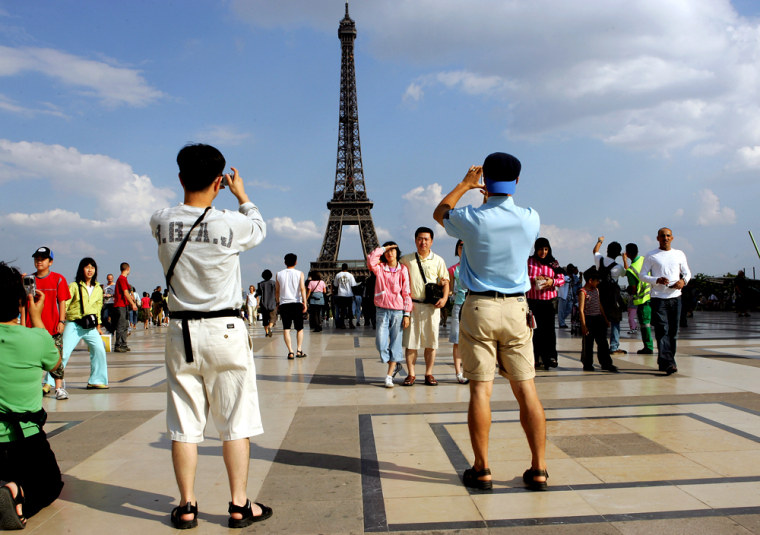Have you ever wondered how local people always seem to know you're a tourist when you are traveling abroad?
To tell you the truth, it's not rocket science. I'm not a local, I'm an American, and I can spot a fellow tourist from a mile away.
Apart from the obvious differences, like our Yankee English and our baseball caps, there are 10 dead giveaways that the individual in front of you hails from the U-S-of-A.
And here they are:
1. Clothes make the tourist. White tennis shoes almost always announce an American tourist, just as black socks with shorts identify a British tourist. Sweatshirts with university names, baseball caps, cowboy hats and Hawaiian shirts are other signs that you are American.
2. Map quest. You know you've spotted an American tourist when you see him standing in the middle of a busy thoroughfare, consulting a city map with a puzzled look fixed to his face. No, sir, you're not in Kansas anymore.
3. Wallet check. Americans like to keep their wallets in their back pockets. This is not a safe practice, and they seem to be aware of it, because most Americans abroad have the habit of tapping their wallet every so often, just to make sure it's still there. Sadly, the habit is useless. I had my wallet stolen from me once and I never felt a thing. If your wallet gets lifted, the perpetrators will be long gone before you know it, and no amount of tapping is going to change that.
4. Center of the universe. For some reason, American tourists are extra-loud both in action and in words. True, they are on vacation and looking for fun, but they don't have to yell at each other while doing it: "IS THE MOW-NA LISA SUPPOSED TO BE ON THIS FLO-WOR?"
5. Creatures of habit. Whether it is McDonald's in Greece, The Olive Garden in Rome, or Starbucks in Lebanon, Americans tend to flock to familiar names when hunger or thirst sets in abroad. Once in a while, I do it too. Comfort food, I guess.
6. Feeling flush. When American tourists enter foreign toilet facilities for the first time, they are generally overcome with confusion and wonderment. Whether they've encountered an infrared automatic flush, a pull-chain handle, a hole in the ground or a bidet, you can bet their first remark upon exiting will be, "You won't believe what they've got in there!"
7. Friend to all. Aside from the occasional American grouch, Americans are generally a friendly folk. When they are abroad, they are the first to say "Howdy," to ask you to take their picture, to look on a stranger's plate in a restaurant and ask what the food is and whether it tastes good. Unfortunately, many foreign cultures consider this behavior to be overly familiar.
8. Say cheese. Taking pictures is a fact of tourism, but how many pictures do you really need of the homeless man in the corner or the shopkeeper setting up his fruit stand? Tourists will take countless pictures of trivial things, but I guess beauty is in the eye of the clicker.
9. Super sleuth. Before committing to a restaurant, many American tourists will pass by it several times, each time scoping out the menu, sizing up the clientele, and taking notes on what the customers are eating. I once counted 13 pass-bys from a tourist family of five.
10. Regular guy. For some reason, bowel movements are often the subject of American tourists' conversation and are considered a perfectly suitable topic for breakfast-table discussion. Not only that, other Americans who overhear these discussions will often join into the conversation — with enthusiasm!
Being a tourist is nothing to be ashamed of; in fact, I give credit to every American who ventures beyond the snug comfort of his American armchair. But some Americans' behavior abroad is nothing to be proud of, either, and we might be more careful how we present ourselves, especially these days, when the world's opinion of the United States is so mixed. So maybe check your clothes in the mirror, step out of the traffic, turn down the volume, put down that Big Mac and make an effort to appreciate local customs and sensibilities.
But to tell you the truth, even after all such attempts to buff up your image, the locals will still know you're a tourist. The vendors will still make a special trip outside their shop to try to sell you something, and strangers will still ask you where you are from. When that happens, I have an answer. Now, I am very proud of my country, but I'm not too interested in getting into another debate over the Iraq conflict or the ethics of George Bush, so I usually reply, "Canada." With that, the conversation and the haggling ends.
How else can the tourist species be identified? and let me know.
James Wysong has worked as a flight attendant with two major international carriers during the past fifteen years. He is the author of the "The Plane Truth: Shift Happens at 35,000 Feet" and "The Air Traveler's Survival Guide." For more information about James or his books, please visit or .
